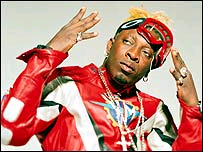Wednesday, 15 September, 2004

Elephant Man's lyrics call for gays to be killed
|
Michael is verbally abused, threatened and spat at every time he leaves his home in Kingston, Jamaica, but the 20-year-old student considers himself lucky.
He has friends who have been beaten and stabbed because they are gay but, as yet, he has not been attacked. He knows it could happen anytime.
"My friends have been chopped up and all of that, you'd think they were a piece of meat in the slaughter house. It is terrible," he says.
Every time he goes out he is called a "battyman" - an abusive term for a gay man - and says the general attitude in Kingston is if you are homosexual you may as well be dead.
.
Asylum
"There is always someone who says 'battyman, beat him up, chop him up, kill him'. I fret and check if they are coming to get me," he says.
Jamaica has a history of entrenched homophobia and violent attacks on gay men and women.
The situation hit the headlines in the UK earlier this month when two controversial Jamaican reggae acts - Elephant Man and Vybz Kartel - were dropped from the British Music of Black Origin (Mobo) awards for refusing to apologise in writing for homophobic lyrics.
|
Michael
|
But homophobia in Jamaica goes far beyond songs lyrics, with gay men and women "beaten, cut, burned, raped and shot on account of their sexuality", according to Amnesty International.
It says while no official statistics are available, according to published reports at least 30 gay men are believed to have been murdered in Jamaica since 1997.
And at least five Jamaicans have been granted asylum in the UK in the last two years because their lives had been threatened as a result of their sexual identity.
Prison riot
"We have talked to people who have been forced to leave their communities after being publicly vilified, threatened or attacked on suspicion of being gay. They face homelessness, isolation or worse," says Lesley Warner, Amnesty International UK media director.
The country's law makes any act of physical intimacy between men punishable by jail, with the possibility of 10-years hard labour.
Few people are openly gay as once their sexuality becomes known they are at risk of attack and often have to move.

Beenie Man apologised for 'hurtful' lyrics
|
Reporting abuse and harassment to the police is not an option for many as officers are frequently known to standby or even join in attacks, says Amnesty.
Michael has not told his family, who live in a parish just outside Kingston, that he is gay as he knows he will be ostracised and even beaten.
"My aunt is the co-founder of our local church and it preaches that homosexuality is a sin," he says.
"If my aunt or any member of the church found out about my sexuality they would just tell everyone and I wouldn't be able to come around any more. I would get hurt."
The church has traditionally been a major force in Jamaican society and plays a significant part in people's daily lives. Many preachers use the Bible to support homophobic sentiments.
Activist murdered
Another major influence in people's lives is dancehall music. Its stars, including international artists such as Beenie Man and Buju Banton, are regarded as "teachers" by the young, says Michael.
The music is steeped in homophobia, with lyrics from Buju Banton's Boom Boom Bye Bye, threatening gay men with a "gunshot in ah head" and Beenie Man's stating "I'm a dreaming of a new Jamaica, come to execute all the gays".
The chance of attitudes changing towards the gay community is small, says Michael.
|
Lesley Warner
Amnesty International |
Concern among human rights groups has intensified even further following the murder of the country's most prominent gay activist in June this year.
Brian Williamson, 59, was one of the few gay Jamaicans willing to stand up in public and be seen talking about homosexuality as a gay man.
The motive for the murder was officially given as robbery, but the gay rights group he founded, J-Flag, believes the killing was a hate crime.
Free condoms
Campaigners say Jamaica's anti-sodomy law also has wider implications in the fight against HIV and Aids in the country.
In 1997, when prison authorities attempted to distribute condoms to inmates at Kingston's main prison, it led to riots in which 16 allegedly gay men died and 40 more injured, says Amnesty.
J-Flag says the law inhibits people from revealing their sexuality to doctors. As a result they are not getting access to appropriate healthcare.
But despite the difficulties and discrimination Michael faces in Jamaica as a gay man, he loves his country and is not prepared to leave.
"I have to stay and try to build my country into a better place," he says.
Michael talks more about his experiences in Gay in Jamaica, a documentary available on the 1Xtra site (see internet links).
To share your views on this story, go to the 1Xtra site.